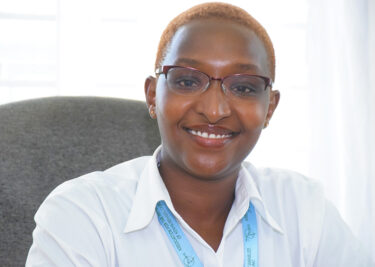Wawira Njiru

Nurtured Values
Wawira means ‘wa kazi’ which in English translates to one of work. And so it seems almost ordained that when Wawira Njiru was named, she was destined to be diligent in her work. However, this was just one thing that informed the values she now holds dear.
Growing up in a family where giving back to the less fortunate was prioritised, Wawira learned from a young age that helping others was part of her purpose. When she joined Precious Blood Secondary School, Riruta, she wore several hats under the community service docket. If she wasn’t assembling her classmates for a cause, she was spearheading small initiatives with the community in mind or simply giving her time at a children’s home. In these selfless deeds, she discovered that there was a nutritional challenge in different communities within Nairobi. A deeper investigation into the matter showed that this also affected school attendance and performance.
Getting Equipped
Discouraged by the food crises in Kenya, Wawira put her thinking cap on. She had acquired a knack for problem solving, and wanted to do what she could to create change. When the time came to pick a course to major in at the university, she decided on Food Science and Nutrition. Studying malnutrition, food insecurity and nutritional deficiencies became the first step in her journey as a budding changemaker. She enrolled at the University of South Australia to pursue this. Inevitably, this decision was her placing her compass strategically – though the trail ahead was still slightly vague.
The Challenge, The Solution
While away, lectures and classes were her primary focus but she also wanted to keep active and do what she was passionate about: giving back. Being based in Australia had its advantages. For starters, she was able to volunteer at a multinational organization and this ex

Image Credit: UN OCHA
posed her to what the NGO systems looked like. But there was something that stood out like a sore thumb: there wasn’t enough focus on countries with rural areas.
Once more she found herself having to strategically come up with a solution to an important problem. Having accepted the challenge, she slowly devised a plan.
Developing a roadmap that would ensure change was not an easy task. It meant intentionally making choices that would lead to change. But one thing about Wawira her, she was positive. This had a ripple effect on her confidence and boosted her forward.
There’s a saying that charity begins at home. In 2012 Wawira independently initiated the Ruiru School Feeding Program. Her aim was to feed 25 children daily. Conscious that she needed money to run the initiative, she created a poster and shared it with her family and friends. Ksh 125,000 later and with the help of her parents, a temporary kitchen was set up and the program was on its way to its mission at Ruiru Primary School. The plan was to keep the momentum going and continue with the school that was close to her family home. But after some insights from her father, she devised a bigger, long-term goal for her initiative and changed the name to Food for Education (Food 4 Education; F4F).
Goals and Readiness for Growth
Two years later, she returned to Kenya armed with a degree and ready to continue the work she’d began abroad. By then her vision had taken shape. The problem she was working to solve was still clear and prevalent: lack of access to food had forced (and was continuing to) many children out of school. Food for Education’s aim was to provide nutritious, subsidized meals to primary-school children. Now, being fully able to physically be part of the program, the goal transformed to feeding 100 children daily. 
Within a year, school attendance and enrolment had visibly changed. Working with school administrations helped track the improvements. By 2016 Wawira was convinced that her initiative was more than just a hobby or part-time philanthropic work. It was a pivotal moment as she decided to work on her initiative full time. To expand awareness on Food for Education, she leveraged her parents’ networks and began building. Resilience was key through the tumultuous journey of establishing an organization. Creativity also became a key tool as the team grew and activities increased.
Ten Years Later…
When she looks back now, a decade later, Wawira sees what devotion can produce.
Currently, Food for Education consists of a team of 200 who range from kitchen staff to various members of the head office. Currently working in 30 schools in four locations (Nairobi, Ruiru, Kiambu and Mombasa towns), Food for Education now aims to feed one million children daily.

Image Credit: UNISA
Core to the organization’s mission is working with local, smallholder farmers who can supply produce needed for the meals. With three active kitchens and another three in development, Wawira and her team are well on their way to their mission. To date, the team has provided well over 6 million meals to children.
All this hard work didn’t go unnoticed. In 2017 Wawira Njiru was among the recipients of the University of South Australia’s Alumni Awards for her contribution to society. The following year she flew to South Africa to receive The Global Citizen Prize: Cisco Youth Leadership Award. Steadfast in her work throughout the CoVid-19 pandemic, in 2021 Wawira was named the United Nations (UN) Person of the Year for her outstanding efforts.
Well done and congratulations to Wawira Njiru who adds to our list of Kenyans of excellence. Onwards and upwards!
#KeExcellence



